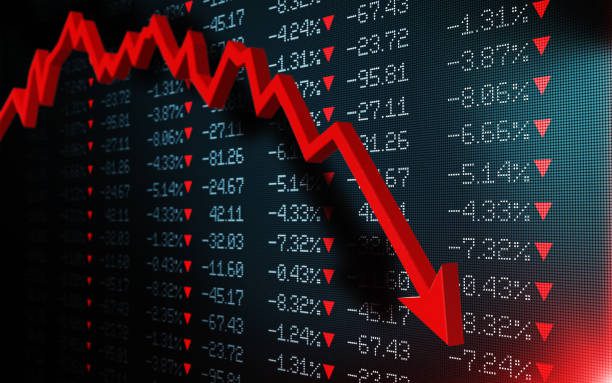The stock market has been in a steady decline since the beginning of the year. Here are 5 reasons why the stock market is falling, and what you can do about it.
1: Interest Rates Are Rising
The Federal Reserve has raised interest rates twice this year and many economists predict that they will continue to do so until the economy strengthens. The Fed’s decision to raise rates is seen as a sign that the economy is improving and that the Fed feels confident in its ability to continue raising rates without causing a recession. Higher interest rates make it more expensive for companies and consumers to borrow money, which can lead to slower economic growth. However, some economists argue that higher interest rates are necessary in order to discourage reckless borrowing and spending by consumers and businesses.
2: Economic Growth Is Slowing Down
The stock market falls because, according to many economists, the economy is slowing down. In fact, the Federal Reserve has said that there are indications that the U.S. economy is slowing down. The slowdown in the economy means that people are not spending as much money and businesses are not making as much money as they were before. This has caused stocks to fall because people think that the companies that are investing in stocks will not make as much money as they would have if the economy was still doing well.
3: Uncertainty In The Market
The markets have been in a downward spiral for the past few weeks, with the Dow Jones Industrial Average (DJIA) losing over 1,500 points since early October. This follows a long and consistent trend of stock market uncertainty, which has investors anxious and looking for guidance.
There are a number of factors contributing to this uncertainty, including global trade tensions, political instability in major economies like China and Europe, and rising interest rates. All of these factors are likely to cause volatility in the market for some time to come.
For individual investors, it’s important to keep things in perspective when it comes to stock market fluctuations. While it’s never fun to see your investments go down (or up!), understanding how the stock market works is essential if you want to make smart long-term decisions.
The stock market is down because of uncertainty. Investors are scared because they don’t know what is going to happen with the economy and other countries.
4: Stock Prices Are Going Up Too Fast
The stock market is a collection of publicly traded companies that are used to represent the value of investments. The stock market is often used as a measure for how well an economy is doing because stocks represent ownership in businesses and, as such, should reflect changes in the broader economy.
However, it’s not just economic indicators that can impact stock prices – news events can also cause stock prices to move quickly. For example, if there is bad news about a company’s financial condition, the share price may fall even though the underlying business may be doing well. Additionally, when investors anticipate future events (such as earnings releases or product announcements), they may buy or sell stocks accordingly.
So what’s causing the recent stock market volatility? There are a few potential explanations:
1) Investor sentiment has been shifting recently due to global political and economic uncertainty. In particular, concerns around trade and tariffs have been driving investor sentiment down recently in some markets (like China) while also spurring buying in other markets (like the U.S.).
2) Some stocks have seen surprisingly high price gains recently – this could be due to
5: Central Banks Are Raising Interest Rates
Central banks around the world have been raising interest rates in recent weeks in an effort to push down inflation and stimulate their economies. The most recent hike came from the Federal Reserve, which increased its benchmark interest rate by 0.25 percentage points to a range of 0.00%-0.25%.
The reasoning behind this move is that the global economy is still experiencing some moderate growth and inflation has been creeping up, which is not good news for consumers or businesses who are already struggling with high levels of debt. Higher borrowing costs can put a damper on economic activity, which could result in lower stock prices as investors fret over future prospects.
There’s no guarantee that higher rates will be successful in reversing the stock market’s downward trend, but it’s worth keeping an eye on as more central banks start to tighten policies.
6: Investors Are Betting On Trump’s Policies
Investors are betting on President Trump’s policies in order to make money, but the stock market may not be reflecting that optimism just yet. The Dow Jones Industrial Average DJIA, -0.26% has fallen by 1,175 points since the election and is now down more than 5%. Some of this falls can be attributed to concerns about fiscal policy and trade agreements, but some investors suspect that Trump’s pro-business rhetoric is a mirage and that his policies will actually hurt the economy.
6.1: Real Estate Prices Are Falling
The stock market has been on a steady decline since November of last year. There are a few reasons for this. Some economists say that the stock market is due for a correction, while others say that the economy is still in a weak state and that investors are over-reacting to recent events. In any case, real estate prices have been falling for some time now, which could be contributing to the overall drop in the stock market.
7: Emerging Markets Are Crashing
The stock market has been in a downward spiral for some time now and it doesn’t seem to be getting any better. The Dow Jones Industrial Average (DJIA) is down over 1,500 points since the beginning of the year and many other markets are following suit. What’s driving this sell-off?
There are a number of reasons why the stock market is falling, but one of the biggest drivers has to do with emerging markets. Emerging markets are a very important part of the global economy and when they start to crash, it has an impact on all markets. For example, China is a big player in the global economy and when their economy starts to slow down, that has consequences for other countries as well.
Another reason for the stock market sell-off is that investors are becoming concerned about President Trump’s economic policies. His proposed tax cuts might not actually lead to higher GDP growth rates as many people think they will, which would mean that government debt would increase rather than decrease. This could lead to higher interest rates which would make it more difficult for companies and individuals to borrow money and invest in stocks or other assets.
There are a few things that you can do to try and understand why the stock market is falling. The first is to look at historical data to try and see if there is any rhyme or reason to it. The other thing you can do is look at economic indicators to see if there is anything that could be driving the market down. If you’re feeling more confident, you can try and make some predictions about what might happen next in the stock market. But ultimately, it’s up to you as an individual investor to decide what steps (if any) you want to take in order to protect yourself from potential losses.
Conclusion
The economy is slowing down, interest rates are rising, uncertainty in the market is causing investors to sell their stocks, and investors are betting on policies that might not pan out. These factors are contributing to the current economic downturn.




2 Comments
Leave a Reply2 Pings & Trackbacks
Pingback:The Housing Market Crash 2023: What To Do If You're Feeling The Heat From | AmcStocks
Pingback:How To Invest In Stocks The Right Way: A Professional 's Guide 7 Tips | AmcStocks